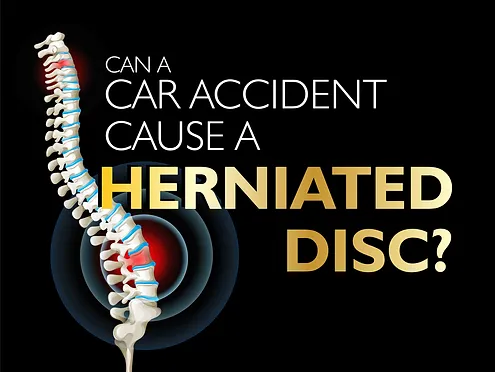What is a herniated disc?
A herniated disc is a medical condition that occurs when the gel-like center of a spinal disc ruptures through a weak or torn outer layer and presses against the nerves in the spine. This can result in pain, numbness, or weakness in the affected area and may also cause discomfort in other parts of the body, depending on which nerves are affected. Herniated discs are typically caused by wear and tear on the spine, but can also be the result of injury or trauma. Treatment options for herniated discs include physical therapy, medication, and in severe cases, surgery. It’s important to consult with a medical professional for proper diagnosis and treatment, as delaying treatment can lead to worsening symptoms and potential complications.
Can a car accident cause a herniated disc?
The short answer is yes, car accidents can cause herniated discs. That is because, during an accident, the impact can cause a person’s spine to be subjected to a significant amount of pressure and cause the discs between the vertebrae to shift out of place or become ruptured.
Some common symptoms of an injury such as this are:
- Pain
Numbness,
Tingling
weakness in the affected area
In more severe cases, surgery may be required to repair the damages sustained. Therefore, if you suspect that you have suffered any injuries related to the accident, the most important thing is to seek medical attention if needed. These symptoms may be immediate or may develop gradually over time. An untreated herniated disc can have serious and long-lasting effects if it is left untreated. That is why having a doctor diagnose the injury through a physical examination, medical imaging such as an MRI, X-ray, or other tests is needed.
Steps you can take to care for a herniated disc as a result of a car accident
- Seek medical attention: It’s important to seek medical attention immediately after the accident or as soon as you notice any symptoms of a herniated disc. Your doctor can diagnose the injury and recommend the appropriate treatment.
Follow your doctor’s treatment plan: Your doctor may recommend a combination of treatments such as pain management, physical therapy, and surgery depending on the severity of your injury. It’s important to follow your doctor’s recommendations to ensure a smooth and speedy recovery.
Rest: It’s essential to rest your back and avoid any activities that may aggravate your injury. Your doctor may recommend a period of rest and avoidance of certain activities to allow your body to heal.
Use hot and cold therapy: Hot and cold therapy can help alleviate the pain and inflammation associated with a herniated disc. Your doctor may recommend applying heat or ice to the affected area.
Maintain good posture: Poor posture can worsen the symptoms of a herniated disc. It’s important to maintain good posture and avoid any activities that put an unnecessary strain on your back.
Consider physical therapy: Physical therapy can help you regain strength and flexibility in your back, which can aid in your recovery. Your doctor may recommend physical therapy as part of your treatment plan.
Consult with a personal injury attorney: If you have suffered a herniated disc as a result of a car accident caused by someone else’s negligence, you may be entitled to compensation. A top personal injury attorney can help you understand your legal rights and guide you through the claims process.
Different Treatment Options For Herniated Discs From Car Accidents
There are several treatment options available for a herniated disc, including:
- Physical therapy: Physical therapy is often used as a first-line treatment for herniated discs. The goal of physical therapy is to help reduce pain, improve flexibility, and strengthen the muscles that support the spine.
Medications: Over-the-counter pain medications such as ibuprofen or naproxen may be used to relieve pain and reduce inflammation. In some cases, prescription medications may be needed, such as muscle relaxants or opioids.
Injections: Corticosteroid injections may be used to reduce inflammation and pain. In some cases, nerve block injections may be used to relieve pain.
Chiropractic care: Chiropractors use spinal manipulation and other techniques to realign the spine and relieve pain.
Surgery: Surgery is typically only considered when other treatments have failed to relieve pain and symptoms. The type of surgery will depend on the location and severity of the herniated disc.
It’s important to work with a healthcare professional to determine the best treatment options for your specific situation.
What are other causes of herniated discs?
- Natural wear and tear on the spine as we age
Poor posture
Repetitive stress injuries
Trauma.
Slip and Falls.
Engaging in activities that involve heavy lifting or twisting
sitting for long periods
Obesity
Osteoporosis
degenerative disc disease
It’s important to take preventative measures, such as maintaining good posture and practicing safe lifting techniques, to reduce the risk of developing a herniated disc.
How much does it usually cost to treat a herniated disc?
The cost of treating a herniated disc can vary widely depending on the severity, location, and treatment required. Treatment options for a herniated disc range from conservative measures such as physical therapy and pain management to more invasive procedures such as surgery.
In general, the cost of conservative treatment for a herniated disc is less expensive than surgical treatment.
According to a 2018 study published in , the cost of conservative treatment for a herniated disc ranges from approximately $3,000 to $7,000 over two years, depending on the type of treatment.
The cost of surgery for a herniated disc can be significantly higher, with estimates ranging from $20,000 to $50,000 or more, depending on the type of surgery and the location of the hospital. However, it’s important to note that the cost of surgery may be covered by health insurance or other forms of medical coverage.
It’s important to discuss treatment costs with your healthcare provider and insurance company to determine the most cost-effective and appropriate treatment options for your specific situation.
How to file a claim for a herniated disc after a car accident
If you have sustained a herniated disc from a car accident, it is important to consider seeking the assistance of a top personal injury attorney to help you navigate the claims process. Consulting with a top personal injury attorney can help you evaluate your options and pursue compensation for your damages, including medical expenses, lost wages, and pain and suffering.
Can you sue for a herniated disc after a car accident?
If the accident was caused by someone else’s negligence, such as running a red light or driving under the influence, then you may have a case to seek compensation for the injuries you sustained. It’s important to work with your personal injury attorney to help you navigate the legal process and build a strong case. Contact Demesmin and Dover Law Firm at 866-954-MORE (6673).


